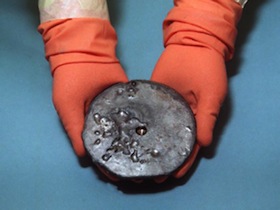Uranium Traffickers Caught, Raises Nuclear Terror Concerns
June 30, 2011
Featured Image
Today's top nuclear policy stories, with excerpts in bullet form.
Stories we're following today: Thursday, June 30, 2011.
Arrests in Moldova Over Possible Uranium Smuggling - Andrew Kramer in The New York Times [link]
- The police in Moldova said Wednesday that they had arrested six people involved with a criminal group that said it was dealing in smuggled nuclear materials and was active in the former Soviet Union and in Arab countries.
- The Moldovan authorities said that the suspects, who included four Moldovans, one Russian and one resident of the Russian-backed separatist region of Transnistria in eastern Moldova, had sought a buyer for what the suspects said was bomb-grade uranium, Western and Russian news agencies reported.
- They [sic] gang’s members had sought to sell uranium that they said was enriched to an unspecified refinement of the isotope 235 for between $29 million and $144 million per kilogram, the police statement said.
- The prevalence of these cases, including frauds and other scams, illustrates the difficulties associated with the legacy of the loosely guarded Soviet weapons program.
World's top shipper suspends some Iran ops over sanctions - Randy Fabi in Reuters [link]
- The world's largest container firm [Maersk Line] suspended operations at several Iranian ports on Thursday, potentially disrupting critical food shipments as it complies with tightening U.S. sanctions … [it] manages several refrigerated ships and container vessels that transport food to the country, including wheat, rice and bananas from Asia.
- "Maersk Line is committed to complying with all relevant foreign trade controls and sanctions programmes," said Morten Engelstoft, chief operating officer for Maersk Line in a statement on Thursday.
- [However,] Maersk operates in other Iranian ports and could also divert shipments to Dubai, partnering with other companies that are not bound by U.S. sanctions aimed at curtailing Iran's alleged nuclear weapons programme.
Iran testing potential nuke missiles? - Chris Lawrence on CNN Situation Room [link]
- Has Kristensen of the Federation of American Scientists and Laicie Olson of the Center for Arms Control and Non-Proliferation are interviewed by CNN for Wolf Blitzer’s Situation Room.
- Their analysis is that Iran, if it chose to do so, is five to ten years away from being able to attach a nuclear warhead to a missile. Video below:
United Nations’ New Arms Watchdog: North Korea - Spencer Ackerman in Danger Room [link]
- This is what makes people dismiss the United Nations as a geopolitical joke. Take the most bellicose, militarized, scofflaw nation on earth. Now make it the head of a disarmament council.
- The presidency of U.N.’s Conference on Disarmament is now held by North Korea.
- If there’s an upside, it’s that the Conference on Disarmament is already a broken instrument. Its members openly refer to its “current paralysis.” It’s failed to negotiate a fissile material cut-off treaty for 13 years running, a core part of its rationale.
- On the bright side, Pyongyang probably give up the presidency before it spreads nuclear material to the four corners of the Earth.
Report: Pakistani ‘Neo-Taliban’ Most Dangerous Terror Group - Charles Hoskinson in Politico [link]
- Violent Islamist groups in Pakistan have coalesced under the Taliban umbrella to become the world’s most significant terrorist threat and are the most capable of obtaining nuclear weapons, according to a report released Wednesday (PDF).
- “[The Pakistani ‘Neo-Taliban’] are violent Islamists with a global agenda...It’s a highly capable group that can seek and will seek nuclear weapons,” said Charles Blair, director of the Terrorism Analysis Project for the Federation of American Scientists.
- The report comes amid increasing congressional and public pressure for Washington to get tough with Pakistan, which has sparked a similar pushback from Islamabad. But senior U.S. officials and leading lawmakers insist that the relationship, while complicated and at times frustrating, is too important to abandon.



